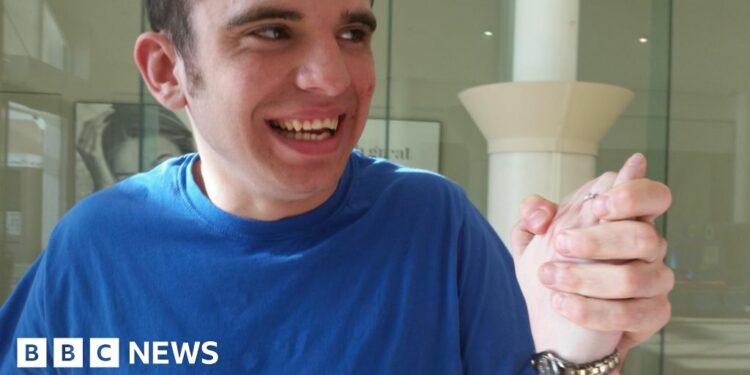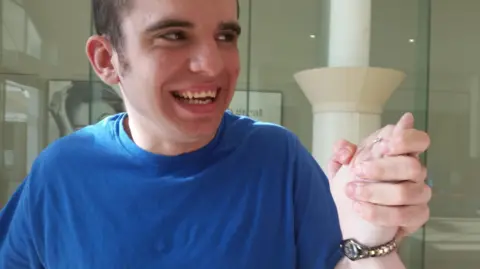 Family handout
Family handoutThe family of a man who died after he repeatedly banged his head against a wall in a mental health suite said there was no “safety net” for people with their son’s needs.
Declan Morrison, 26, from Cambridge, was autistic, had severe learning disabilities and attention deficit hyperactivity disorder.
In the hours before his death, he was left naked in a room with CCTV cameras, but his family said the alarm was only raised after he was found unresponsive by staff.
His parents, Graeme and Sam Morrison, are now calling for answers about what went wrong with their son’s care.
Mrs Morrison said: “He was left to his own devices in a surrounding that he couldn’t understand, with no stimuli, bright lights and bare walls.”
In March 2022, Declan spent 10 days in the Section 136 mental health assessment suite, as there were no beds available across the UK.
But he could not cope with the austere, clinical environment which, under the Mental Health Act, should be used for a maximum of 24 hours.
The suite was described by coroner Simon Milburn as “wholly inappropriate” for Declan’s needs.
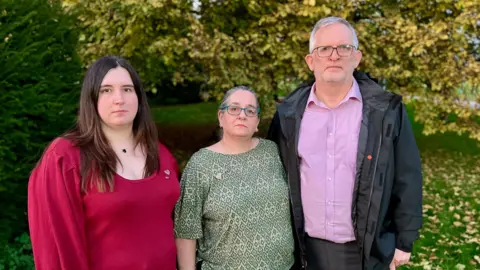 Steve Hubbard/BBC
Steve Hubbard/BBCMr Morrison believed the decision to rely on CCTV and not interact with Declan might have “exacerbated the situation”.
The coroner said staff in the facility had not been appropriately trained to care for patients with learning disabilities.
Mrs Morrison said she only found out something was wrong with Declan on 18 March 2022 when he was in the ambulance.
“To find out actually your son now needs a brain operation to live – it was horrifying,” she said.
Declan underwent emergency surgery but never recovered. He died on 2 April 2022.
 Family handout
Family handoutFrom 2014 to 2021, Declan lived in Sunndach House near Peterborough, run by Kisimul, a company owned by a Luxembourg-based investment fund.
In 2019, following a review of Declan’s needs, it was concluded the facility could no longer provide the appropriate level of care to protect him.
Yet in 2021 Declan was still living in Sunndach House.
Declan’s family said his behaviour had worsened after some of his carers left to work at a nearby Amazon warehouse for an extra 50p an hour.
“Something as simple as 50p is making a difference, and it’s affecting our children,” Mrs Morrison said.
At the same time Declan was struggling to understand the loss of familiar carers, his family said his medication was also changed.
In evidence given by an independent psychiatrist at his inquest in October, the jury heard how side effects to the new drugs could have made his behaviour worse.
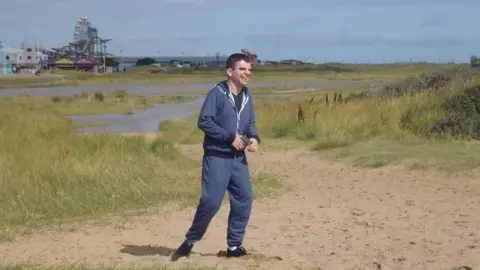 Family handout
Family handoutIn May 2021, Declan was moved to Yewdale Farm in Willingham, Cambridgeshire, a residential care home run by CareTech Community Services.
A safeguarding report entitled Something has to Change, which was compiled by the Cambridgeshire and Peterborough Safeguarding Partnership after Declan’s death, noted there was a high level of agency staff caring for him.
Yet his father said Declan had “spent most of his time on his own as they [staff] couldn’t interact with him.”
CareTech said when Declan had been “responsive” to staff’s engagement, they would directly support him. If he did not want to interact, staff would sit in an adjoining room and observe him through a window.
At Yewdale Farm Declan had jumped over fences and assaulted a staff member.
In February 2022, CareTech said that it could no longer meet Declan’s needs and he needed clinical care.
Sixty-seven facilities across the UK were approached to care for Declan, but none were able to offer him a placement, according to the family’s lawyer.
In a letter to the government and the NHS, the coroner said: “Demand for such placements outstrips supply – providers are effectively able to ‘pick and choose’ who they offer placements to.”
“It seems wrong that a care provider can, at a drop of a hat, remove care, because there’s certainly no safety net behind that, because it’s just not provided for by local government,” Mr Morrison said.
“It can’t just be as simple as ‘we can’t keep your son or daughter safe’,” he said.
Caretech said it did not “pick and choose” its residents.
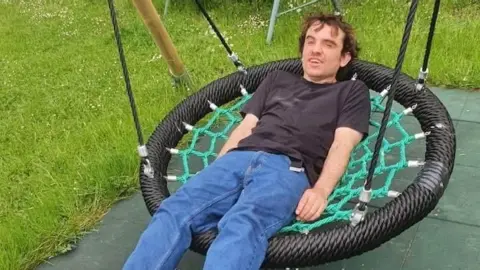 Family handout
Family handoutIn March 2022 Declan suffered an episode of heightened anxiety and he was detained by police officers under the Mental Health Act.
He was taken to an emergency “place of safety”, known as Section 136 suite, on the site of Fulbourn Hospital in Cambridgeshire.
The suite is designed for patients awaiting a mental health assessment. Declan stayed there for 10 days instead of the stipulated 24 hours.
Declan’s parents were in Aberdeen at the time but his father said they had been told he was “doing fine”.
‘Repeatedly hit his head’
 Steve Hubbard/BBC
Steve Hubbard/BBCSaoirse Kerrigan, the family’s solicitor, said Declan had begun “bouncing off the walls”, which resulted in a catastrophic brain injury.
Ms Kerrigan, from law firm Leigh Day, said: “These injuries were sustained while Declan was being monitored by eight CCTV cameras and under 24-hour observation by nursing staff located within the site.”
She added he had been “growing increasingly agitated and repeatedly hitting his head”.
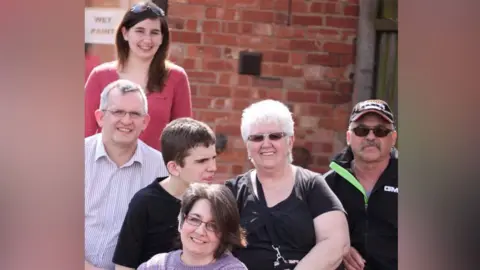 FAMILY HANDOUT
FAMILY HANDOUT‘Highest priority’
The coroner’s prevention of future deaths report said the mental health suite had caused Declan to go into deeper crisis and “ultimately this resulted in his death”.
Cambridgeshire County Council and the NHS in Cambridgeshire and Peterborough said they accepted this.
Both organisations said a learning disability and autism improvement programme would be rolled out from spring 2025.
Cambridgeshire and Peterborough NHS Foundation Trust, which runs mental health services, said it had tightened processes to improve patient care when someone spends more than 24 hours in the Section 136 suite.
Kisimul acknowledged problems with the “loss of key employees”, which it said had been partly caused by Brexit and competing industries.
Nicky Cooper, Kisimul’s director of quality and practice, said the welfare of people the service helped was the “highest priority”.
The Department of Health and Social Care said the new Mental Health Bill would “improve the monitoring of people with learning disabilities and autism who may be at risk of going into crisis”.
The bill would legally require the NHS and local authorities to ensure the needs of people like Declan were met without detaining them in hospital.
NHS England said it had drawn up guidelines and was “carefully considering” the coroner’s report.
- If you have been affected by this story or would like support, you can find organisations which offer help and information at the BBC Action Line.
Source link : https://www.bbc.com/news/articles/cx2l0yvzyvro
Author :
Publish date : 2024-12-09 23:26:14
Copyright for syndicated content belongs to the linked Source.

